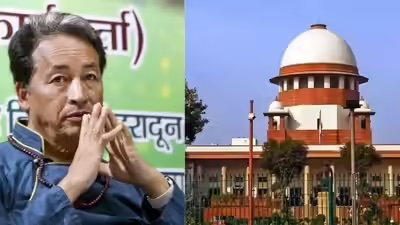Lagatar24 Desk
New Delhi: The Supreme Court on Monday issued notices to the central government and the Ladakh Union Territory on a plea filed by Sonam Wangchuk’s wife challenging his detention under the National Security Act (NSA). Wangchuk, a renowned climate activist and educationist, was arrested following violent protests in Ladakh’s Leh that left four people dead.
Top Court Seeks Response, Hearing on October 14
A bench comprising Justices Aravind Kumar and NV Anjaria heard the plea filed by Wangchuk’s wife, Gitanjali J Angmo, which sought his immediate release and challenged the legality of his detention. Solicitor General Tushar Mehta, appearing for the government, maintained that “the law has been followed and grounds of detention supplied to Wangchuk.”
However, the court declined to issue any interim order directing that the detention grounds be shared with Gitanjali and scheduled the next hearing for October 14. Reacting to the development, Gitanjali expressed gratitude towards the Supreme Court, stating that she would meet Wangchuk in Jodhpur to obtain the detention grounds and prepare for the upcoming hearing.
Background: Protests and Detention Under NSA
Wangchuk was detained on September 26, two days after protests demanding statehood for Ladakh and inclusion under the 6th Schedule turned violent in Leh. A faction of mostly young protesters broke away from the peaceful hunger strike led by Wangchuk and clashed with security forces. Authorities accuse him of “inciting” the violence.
Following his detention, Wangchuk was transferred to Jodhpur jail in Rajasthan under the NSA — a stringent law that allows preventive detention without charges for up to 12 months. His wife subsequently petitioned the Supreme Court and earlier wrote to President Droupadi Murmu, alleging a “witch-hunt” against her husband for advocating Ladakhi rights since 2019.
Wife Alleges Misuse of Police, Compares to Colonial Era
Gitanjali, who heads the Himalayan Institute of Alternatives Ladakh (HIAL), accused the Union Home Ministry of “misusing” the Ladakh Police to suppress dissent. Drawing a parallel to British colonial tactics, she wrote on X, “In 1857, 24,000 Britishers used 135,000 Indian sepoys to oppress 300 million Indians. Today, a dozen administrators are misusing 2400 Ladakhi police to oppress and torture 3 lakh Ladakhis under the orders of the MHA.”
Her petition argues that Wangchuk’s detention is unconstitutional and intended to silence legitimate democratic demands for statehood and constitutional safeguards for Ladakh.









